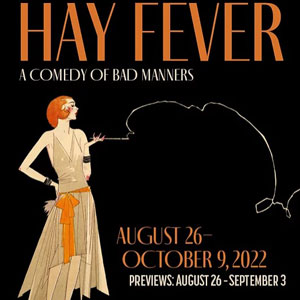
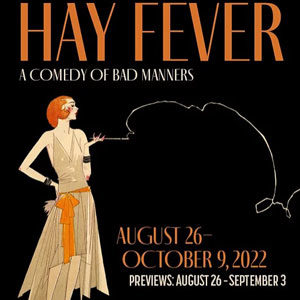 [rating=3]Energetic and highly professional acting and fine directing by Terry McCabe make the Noël Coward classic “Hay Fever” a competent performance. The cast does a great job putting on a show that has gotten critical acclaim since the time when it was first produced in London in 1925. But today this well-known script about a comedy of manners and a comedy of rudeness has unfortunately not withstood the test of time. To my mind, the script is too old and not entertaining enough to remain a true comedy, plus the social commentary within this show is quite dated. The characters have to be made somewhat deeper and more relevant so that the audience cares about them; either that or the show has to be turned into a complete farce so as to make the humor work. The biggest problem with “Hay Fever”, however, is that it is much too plodding and predictable. Despite its clever premise, the play’s lack of any true surprise robs it of much of its expected fun. Thus, my criticisms of the show have nothing to do with how this production has been executed and more to do with how changes in society over the past hundred years have made the show less relevant and interesting than it might have been to previous generations of theatregoers.
[rating=3]Energetic and highly professional acting and fine directing by Terry McCabe make the Noël Coward classic “Hay Fever” a competent performance. The cast does a great job putting on a show that has gotten critical acclaim since the time when it was first produced in London in 1925. But today this well-known script about a comedy of manners and a comedy of rudeness has unfortunately not withstood the test of time. To my mind, the script is too old and not entertaining enough to remain a true comedy, plus the social commentary within this show is quite dated. The characters have to be made somewhat deeper and more relevant so that the audience cares about them; either that or the show has to be turned into a complete farce so as to make the humor work. The biggest problem with “Hay Fever”, however, is that it is much too plodding and predictable. Despite its clever premise, the play’s lack of any true surprise robs it of much of its expected fun. Thus, my criticisms of the show have nothing to do with how this production has been executed and more to do with how changes in society over the past hundred years have made the show less relevant and interesting than it might have been to previous generations of theatregoers.
“Hay Fever” is a story about a group of people who are supposedly allergic to each other, yet are adept at playing psychological games in the name of politeness. These individuals are not toxic to each other, and they aren’t necessarily bad people or poorly intentioned. But they basically show the most superficial sides of themselves to the world. The action revolves around Judith Bliss (Betsy Pennington-Taylor), the once-famed actress, now in middle-age, who hopes to obtain a starring role again. She is married to David Bliss (Stephen Fedo) the once-famed author, who hopes to write the next best seller. But their marriage is not a solid one; perhaps we might think of it as an open relationship. Their children Sorel (Lizzie Williams) and Simon (Travis Shanahan) have both announced at the beginning of the show that they have dates that they intend to bring home with them for the weekend to stay in the Japanese bedroom of their ample country house, a train ride away from London. Not only do the siblings argue with each other about which one of their guests should come and visit, but to their chagrin, their parents have each decided to bring home their own lovers for that exact same time period. It would be much too rude and awkward to disinvite anybody, so it turns out to be a very uncomfortable situation when all four guests arrive and the family has to host all of them at the same time.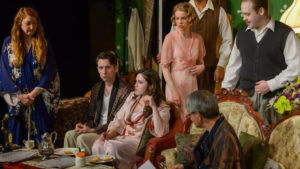
While the family members each have their own distinct personalities, the same cannot be said about their dates/lovers, who (except for gender, age, and appearance) seem to be remarkably plain, obsequious, and undifferentiated. The guests consist of Jackie (Melissa Brausch), Sandy (Robert Hunter Bry), Richard (Gerrit Wilford), and Myra (Elizabeth Wigley). The only authentic character in the play is Clara (marssie Mencotti), the faithful household servant who also serves as Judith’s dresser. Obviously, she is paid in her position and does her work well enough that she feels free to say things as they really are. (What a great performance by Mencotti!)
When the family and its visitors are literally thrown together in the same house, it becomes a comedy of errors and missteps. Obviously, the combined discomfort and superficiality among the eight individuals is meant to be funny, especially when they struggle to be polite. What remains universal and timeless about this production is its underlying theme that we might become uncomfortable when suddenly thrust together with others whom we don’t already know or have little or nothing in common with. Additionally, the story hinges on the old-fashioned norm of “Gemutlichkeit”, or the feeling of coziness and comfort, which, in the 1920s—before the advent of radio or television or home entertainment systems—meant doing things together as a group. Either someone played the piano or a musical instrument or the group sang songs or played parlor games to pass the time in the evening. This longing for togetherness, in contrast, has become largely absent in modern society (though it may have changed somewhat as a result of the COVID shutdown, but I digress.) To put things another way, it is not necessarily considered antisocial today to watch a television show or to play on the computer separately from everybody else when one is an invited guest. The uses of technology have largely changed things over the past century, and discomfort back then may not necessarily translate into discomfort today—and thus a good deal of the humor having to do with the culture of manners no longer exists.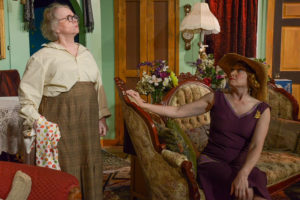
When the guests in the story dislike being placed in an untenable situation where they are constantly deferring and posturing, they take advantage of the first opportunity to leave, that is, without appearing to be rude. This action is meant to be funny, but, instead, it is totally logical and serious. When the show is supposed to be a riff on phoniness and on people not saying what they really think or believe, the laugh is supposed to be on us, the audience. Don’t we all have a social filter and a superficial side to ourselves, regardless of our background or station? Think about the small talk that people engage in when they don’t already know each other. But today, people are generally not as committed to “Gemutlichkeit” and might prefer to speak their mind or to leave the room when things grow uneasy or unpleasant within a crowd—or they may choose to play with their cell phone.
Furthermore, we are pretty much clued in from the outset that all of the characters will probably turnabout and pair off much differently than initially expected. One highlight of the show, then, is when Judith “permits” more than one member of a dating couple to become involved with some other individual whom they have met during the weekend. Since all the characters won’t speak their minds, nobody openly objects to Judith’s pronouncements. But it all seems to make no difference. The characters nicely hide their upset for the moment, which is what is being expected of them. The problem, however, is that the audience really doesn’t care one way or the other, because we’re not invested enough in such shallow people. They exude no warmth nor stir the imagination, so we don’t see ourselves in them. Besides, the production is not enough of a farce such that this superficiality becomes inconsequential.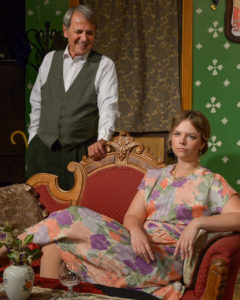
Costumes by Rachel Parent are lovely in this production, particularly the women’s outfits and the dress worn by Judith. The set by Ray Toler is appropriate to tell the story, and I particularly liked the antique sofa and lamps and the head of the wild boar hanging on the wall.
Clearly, Noël Coward’s point in penning this play is to couple the themes of politeness and social discomfort with the (presumed) shallowness of middle-class life in England in the 1920s. Unfortunately, too many portions are not all that funny as they are meant to be. Thus when the tale is no longer humorous in the spirit that the playwright envisioned it, this makes its larger commentary on good and bad manners more easily dismissive. What this means in the long-run is that this vintage script needs a good overhaul and adaptation so as to hold a modern audience’s full attention and keep us laughing throughout as originally intended. The production is a good one; it’s the script that is lacking.
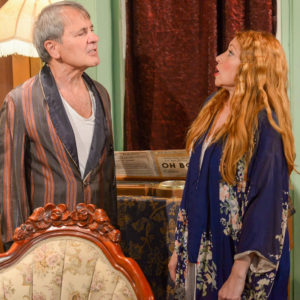 “Hay Fever: A Comedy of Bad Manners” is playing through October 9, 2022, at the City Lit Theater, on the second floor of the historic Edgewater Presbyterian Church building, at 1020 W. Bryn Mawr Avenue, in Chicago
“Hay Fever: A Comedy of Bad Manners” is playing through October 9, 2022, at the City Lit Theater, on the second floor of the historic Edgewater Presbyterian Church building, at 1020 W. Bryn Mawr Avenue, in Chicago
General admission tickets – $34
Seniors – $29
Students and military – $12
(All plus applicable fees!)
Performances
Friday 7:30
Saturday 7:30
Sunday 3:00
For information and tickets, go to https://www.citylit.org/ or phone 773-293-3682.
Proof of vaccination is required for all attendees. Refunds will not be issued if admittance is refused due to lack of vaccination documentation. You will be required to wear a mask inside the church and theatre unless actively drinking or eating.
To see what others are saying, visit www.theatreinchicago.com, go to Review Round-Up and click at “Hay Fever: A Comedy of Bad manners”.






More Stories
“Throbbin Wood” reviewed by Julia W. Rath
“Royko: The Toughest Man In Chicago” revisited review by Julia W. Rath
“Falsettos”